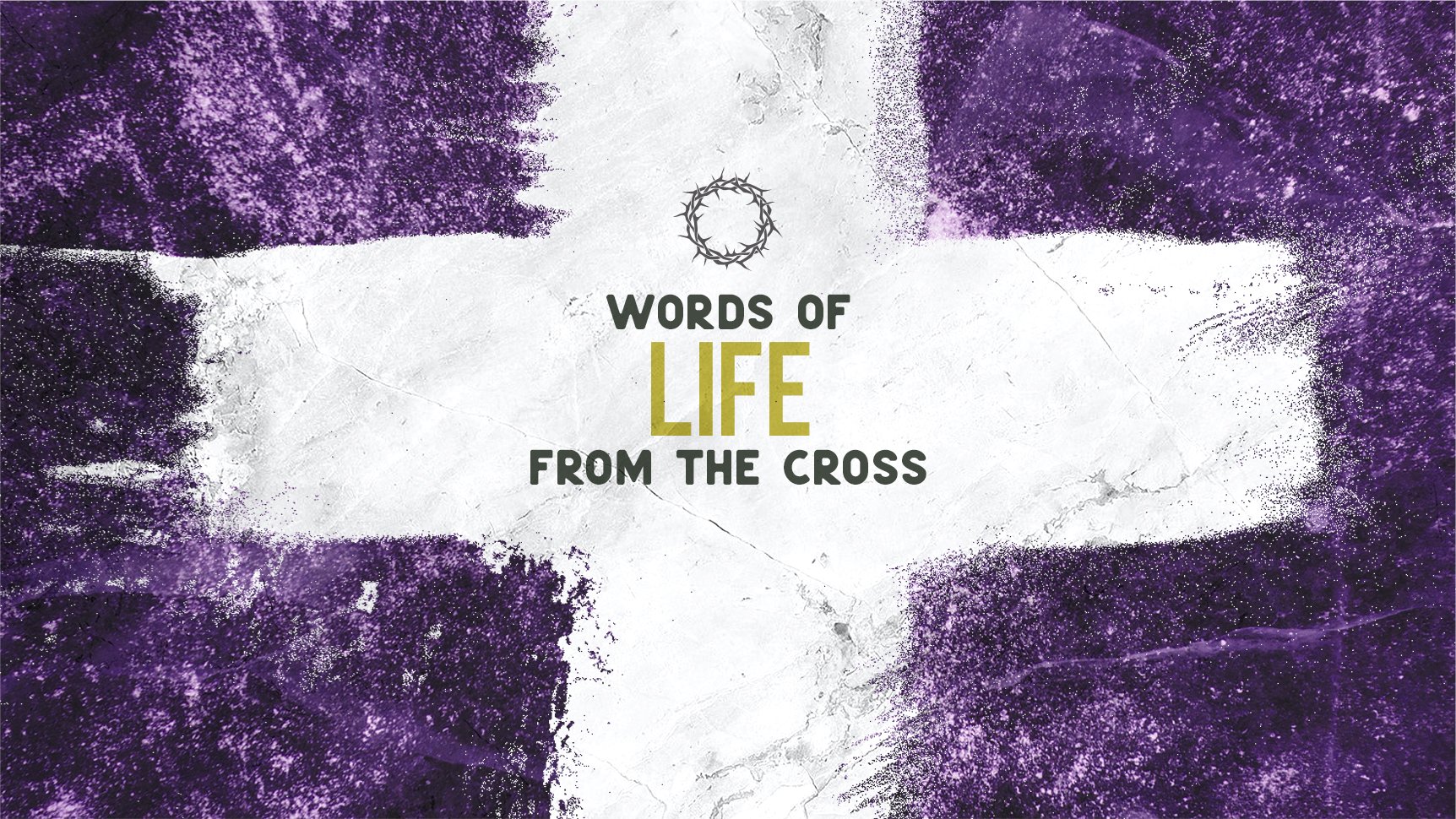The Promising Word | First Sunday of Lent | Luke 23:43
“Truly, I say to you, today you will be with Me in Paradise.”
March 6, 2022 | 10:45 a.m.
The First Sunday of Lent
The word from Jesus’ dying lips we’re discovering is this message is a word of promise and salvation: “Truly I say to you, today you will be with Me in Paradise.” These words are spoken not to a religious man or to a fine upstanding citizen or to one of His disciples. They are spoken to a convicted man guilty of a capital crime. He, together with his fellow convict, were hung on crosses with Jesus between them. Jesus is the innocent One among the guilty, the Man among the thieves. These two convicted criminals are the ones given the privilege of being at Jesus’ left and His right when He comes into His kingdom, a privilege the disciples bickered over but had no idea what they were asking. Who could have known?
We do not know the exact nature of their crime. “Thieves” is what they are called. Perhaps “insurrectionist” or even “terrorist” might strike somewhat closer to the reality. These were no common robbers, but those who presented a threat to Roman security. Their public crucifixion was intended to ward off others.
READINGS
Job 14:10-13
Psalm 86:1-5
Revelation 2:1-7
Luke 23:39-43
message presented by Rev. Frank C. Ruffatto
+Points to ponder
- Do you take any comfort from Jesus’ remark to the thief, “Truly, I say to you, today you will be with Me in Paradise”?
- What does it mean (and mean to you) that “While we were sinners, Christ died for us.”?
- How does confession and absolution in the Divine Service comfort and help us?
+Sermon Transcript
Grace, mercy, and peace be unto each of you from God our Father and our Lord and King, Jesus the Christ. Amen.
Let us pray: Heavenly Father, Your Son confronted the powers of darkness that obscure Your compassion and love for all of creation: help us to use these days to grow in wisdom and prayer, so that we may witness to that saving love proclaimed in Jesus Christ our Savior. Amen.
The first word from Jesus’ dying lips is a pardoning word in the form of a prayer. “Father, forgive them, for they know not what they do.” What wondrous love is this that pardons the persecutor, that forgives the injurer even as the injury is being inflicted, that makes peace with the enemy while the battle rages on? Such a pardoning word the world does not know and cannot speak. Only the Suffering Servant-Son can pray such a prayer and speak such a word. He came to give His life as a ransom for the many.
And in the enormous wake of that first word, today we hear the second word from Jesus’ dying lips; and, it is a word of promise and salvation: “Truly, I say to you, today you will be with Me in Paradise.” These words are spoken not to a religious man or to a fine, upstanding citizen or to one of His disciples. They are spoken to a convicted man guilty of a capital crime. He and his fellow convict were hung on crosses with Jesus between them. Jesus is the innocent one among the guilty, the Man among the thieves. These two convicted criminals are the ones given the privilege of being at Jesus’ left and His right when He comes into His kingdom, a privilege the disciples bickered over but had no idea what they were asking. Who could have known?
We do not know the exact nature of their crime. “Criminals; thieves” are what they are called. Perhaps “insurgent” or even “terrorist” might strike somewhat closer to the reality. These were no common robbers but those who presented a threat to Roman security. Their public crucifixion was intended to ward off others.
There they hung, one on Jesus’ right, the other on His left. Legend puts the “good” one on Jesus’ right, the “bad” one on His left, perhaps in view of Jesus’ parable of the sheep and the goats. The one on Jesus’ left reviles Jesus and hurls insults at Him, joining the chorus of the religious leaders and the passers-by who had come to shake their fists. “Aren’t You the Christ? Save Yourself and us!”
Strange, isn’t it, that the man’s mockery should come in the form of a prayer for salvation? “Save Yourself and us!” This is not a prayer of faith but of derision. What kind of Christ are You? What sort of Messiah are You going to be? Flex some of that messianic muscle and save Yourself and us too. Or are you a fake, an impostor, a phony Christ? Spare Yourself from this death and spare us too.
This thief on the left is the spokesman for the unbelieving world. His mocking “prayer” comes in the form of a demand, not a “Kyrie.” If Jesus is worth His salt as a Messiah, He would come down from that wretched cross and save Himself, and while He was at it, save His fellow criminals. But that is not the way of salvation at all. That is the devil’s way, the way that Peter represented when he took Jesus aside and rebuked Him for speaking of His death and resurrection. This mocking prayer echoes Satan’s temptations in the wilderness: “If You are the Son of God ... If You are the Christ ... ”
The thief on the right instead rebukes his fellow thief. “Do you not fear God, since you are under the same sentence of condemnation?” We hear in Proverbs that “the fear of the Lord is the beginning of wisdom.” To fear the Lord is to put all others fears in their place. As Dr. Luther puts it: “We should fear, love, and trust in God above all things,” certainly in life and especially at our life’s end, when we, too, find ourselves under the same death sentence of the Law. To fear the Lord under those circumstances is to be wise in the way of faith, trusting that in life and in death, Jesus is mighty to save.
This thief is a penitent. He is rueful for a life gone wrong and he confesses his sin; he tells the truth. “And we indeed (are condemned) justly, for we are receiving the due reward of our deeds.” “The wages of sin is death.” ‘How does he come to (this confession) at this late moment in his life? We (really) have only one answer: it was (shaped) in him by his contact with Jesus.’ The thief recognizes his sin and confesses it. The only truth a liar can say is: “I am a liar.” The only truth a sinner can say is: “I am a sinner.”
The thief is also faithful. This “criminal … bears witness to Jesus’ innocence, recognizing His majesty and grace.” He confesses Christ saying, “But this man has done nothing wrong.” Behold the unblemished Lamb of God! He is pure, holy, and innocent.
We, on the other hand, are guilty, justly convicted. Did the thief understand all the implications of what he was saying? Did He fully understand who Jesus was for him? What did he actually know of Jesus? We do not know. All we know is his dying prayer: “Jesus, remember me when You come into Your kingdom.” Of all the people to address Jesus, he is the only one to use Jesus’ name without some other title. Simply “Jesus.” Familiar, direct, no fawning or flattery – Jesus. Death is the great leveler; it puts everyone on a first-name basis.
“Remember me when You come into Your kingdom.” A simple word of faith. He sees this broken, bleeding, dying man next to him and takes the sign over His head literally. He is a King with a kingdom; and, all this criminal asks is to be remembered. Not spared the agonies of death, not rescued – simply remembered. And this tiny little mustard-seed-sized faith is acknowledged by Jesus and credited to the thief as righteousness sealed with Jesus’ own Amen: “Truly, I say to you, today you will be with Me in Paradise” This “recalls Eden’s garden and God’s presence with Adam and Eve. Christ restores to their descendants what they had lost, and more. Whereas the criminal had spoken an indefinite “when,” Jesus responds with a definite “today.” And more, this “is an absolution. By this word Jesus acquits this criminal of sin and guilt. He accepts him as one of His own. By this word He here and now unlocks heaven for him.”
Now, some people wonder and speculate. Was this criminal baptized? Some would make the grand exception out of him to show how Baptism is not necessary. But that is missing the point. He has no need for either Baptism or the Lord’s Supper. The Sacrament of sacraments is there next to him: dying Jesus nailed to the cross. What more does he need? His preacher is the sign over Jesus’ head, written in Latin, Greek, and Aramaic – Jesus of Nazareth, King of the Jews, and all the people who are taunting Jesus, calling Him the Christ and the Son of God.
What sort of Man is this who promises Paradise to a dying thief who admits the guilt of crime? What sort of justice is this that speaks pardon to the unpardonable, that acquits the guilty, that saves those society deems unsalvageable and worthy of the cruelest form of death? This is the Savior of the world, the Redeemer of fallen mankind, the One who reconciles the enemy as enemy and justifies the sinner as sinner. “While we were still sinners, Christ died for us.” Jesus was crucified that we may be spared the coming judgment, hear His word of absolution, and enter into paradise with Him. He not only saved others but is also the messianic King who saves me and you. We all justly deserve God’s judgment because of our sinful deeds. Yet, because Jesus sacrificed Himself for us all, we have His word of absolution and the promise of being with Him in paradise. As Jesus taught His disciples: Truly, truly, I say to you, whoever hears My word and believes Him who sent Me has eternal life. He does not come into judgment but has passed from death to life.”
And Jesus speaks to you and me: “Today, you will be with Me in Paradise.” Hear that word of promise for yourself. Hear it now, and at the hour of your death, for none of us knows the day and the hour of our “Today” when Paradise is opened to us in our death. Amen.
“May the God of hope fill you with all joy and peace in believing, so that by the power of the Holy Spirit you may abound in hope.”
Background and Sermon Study notes from Words of Life from the Cross, Concordia Publishing House, St. Louis, Missouri, 2009
ABOUT THE SERIES
This series features words of Christ He spoke from the cross as He offered up His life for the life of the world. Each word imparts a blessing and is a word of Gospel. The sermons and devotions in this series will expound on these words of Christ, linking them to Jesus’ words and works recorded in the Gospel as well as the Old Testament prophesies that pointed to Him. Each word of Christ proclaims and delivers something about Him, the Word Incarnate, and delivers His saving death to us that we would trust Him for forgiveness, life, and salvation.










